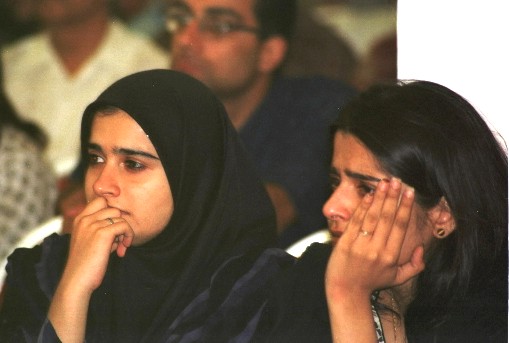Humanity Must Survive: A-bomb Survivor’s Journey to India and Pakistan, Part 6
Jul. 4, 2010
Persisting hope
by Tetsuzo Yamane, Staff Writer
This look back at an A-bomb survivor's travels in India and Pakistan was originally published in July 1998.
Appealing for peace, not giving in to violence
At 6 p.m. on June 23, Yasuhiko Taketa, 65, an A-bomb survivor (hibakusha) and a resident of Aki Ward, Hiroshima, began to share his A-bomb experience with an audience of 150 people in the banquet room of a hotel in the heart of Islamabad, Pakistan.
When he spoke about the last moments of his older sister Motoko, who died at the age of 16 three days after experiencing the atomic bombing, Hena Zuberi, 24, a TV reporter sitting in the third row, buried her face in her hands. Her left hand trembled slightly. A deep furrow appeared between her eyebrows and tears rolled down her cheeks.
"My younger sister is also 16 years old. I can't imagine such a cruel thing happening to her." Ms. Zuberi's voice quavered, and she continued: "Nuclear weapons can't protect our national security. I'm more scared of the possibility that nuclear war may occur by mistake."
After the meeting, I posed a question to Ms. Zuberi, realizing that I was probably being rude: "How will you report on this meeting?" "Well, I attended the meeting personally..." But then her speech faltered.
Two days later, in Lahore, I met Mubashir Hassan, 76, the former finance minister and an advocate of the "Pakistan-India People's Forum for Peace and Democracy," which had organized a series of peace meetings.
When I told him about Ms. Zuberi, he showed sympathy on his kindly face. Dr. Hassan said that they could not broadcast what was inconvenient for the government, and that Ms. Zuberi could not be singled out for blame.
Among the three TV stations in and around Islamabad, two are state-run TV stations. The other, a private TV station, rarely reports news. Even when it does, I heard, the contents of the news are no different from the news released by the two state-run TV stations.
In addition, a local newspaper in Karachi was, almost every day, covering murder cases involving members of ethnic or political organizations due to political conflicts. According to The Nation, an English-language newspaper, the toll from January through June 27 reached a total of 463 victims.
Three weeks before the meeting at which Mr. Taketa shared his A-bomb experience, 20 members of an Islamic fundamentalist group stormed into a news conference held by the Pakistan-India People's Forum for Peace and Democracy. They disrupted the news conference by resorting to such actions as throwing chairs, and thereby causing injury.
"If we give in to violence, people will hesitate even further to speak up," said Dr. Hassan, who stands 180 centimeters and radiates a steel-like will from his tall, lean frame.
In 1962, when Dr. Hassan taught civil engineering at a university in Lahore, he resisted the imposition of martial law by the military dictatorship, and was forced to leave the university. Though he served as finance minister for three years from 1973, he was arrested several times under the three military regimes and tortured as well. Dr. Hassan has been a fighter for the democratization of Pakistan.
In 1994, motivated by the intensifying dispute over Kashmir, Dr. Hassan won over intellectuals in the pursuit of private exchanges between people in India and Pakistan, and launched the Pakistan-India People's Forum for Peace and Democracy. He has also been holding exchange seminars for citizens of both nations. Last year, Dr. Hassan served as a host for a Hiroshima citizens' group promoting peaceful exchange with India and Pakistan.
"If hibakusha, victims of the war and the atomic bombings, come here many times and make their appeals, the calls for peace will drown out the violence and begin to be reported." Dr. Hassan's words made Mr. Taketa realize anew the importance of sharing his experience of the atomic bombing.
(Originally published on July 8, 1998)








